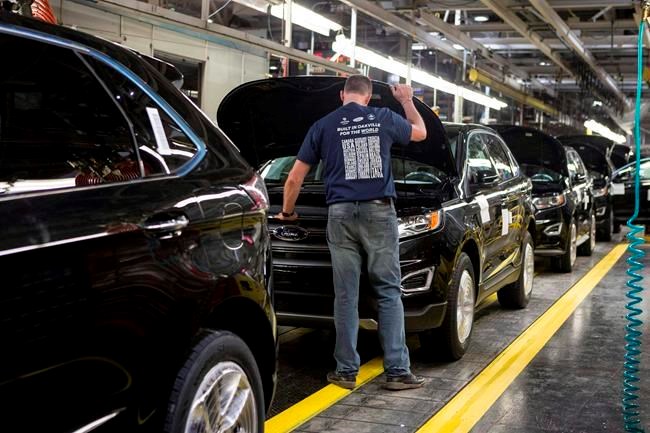TORONTO — The Canadian auto sector has been slowly recovering from the COVID-19 pandemic, though employment is still down nearly 13 per cent in the third quarter from a year ago, according to a report by DesRosiers Automotive Consultants Inc.
The auto sector gained back nearly 15,000 jobs in the third quarter, the report found, after layoffs in the first half of this year when the COVID-19 pandemic shut down dealerships and plants.
But jobs in many parts of the auto industry were still down by double digits in the summer compared with 2019, with an 18.3 per cent drop in manufacturing jobs, a 16.6 per cent fall in dealership jobs, and 12.6 per cent fewer maintenance jobs.
Employment was also down nearly 12 per cent for makers of auto parts and accessories, and 10.1 per cent at parts and accessory stores, while gigs in road construction and gas stations bounced back a bit quicker.
On top of the COVID-19 pandemic, the closure of General Motors' plant in Oshawa, Ont. at the end of last year has also taken a toll on the industry’s workforce, the consultancy said Wednesday.
The report covers the third quarter — before the second wave of COVID-19 worsened. Last week, Scotiabank economist Rebekah Young wrote that as coronavirus cases have risen over the past few months, consumer confidence has fallen and sales of cars and trucks have dropped in Canada, even in areas where dealerships are open.
But DesRosiers managing partner Andrew King wrote that news of a potential COVID-19 vaccine has brightened the outlook for the industry. So, too, have recent labour deals to revive plants in Oshawa and elsewhere, King said.
“The recovery process in employment has been slow for the automotive sector … but signs of recovery are present nonetheless," King said in the report.
This fall, Unifor's union workers at Ford, Fiat Chrysler and GM agreed to deals that would bring new products to Canadian assembly lines over the next few years.
General Motors Canada president Scott Bell has said that growing demand for pickup trucks, as well as need for tech workers to program advanced cars and trucks, has meant the company needed to scale its production quickly.
Plus, Young noted that there are now shortages of car and truck inventory. FCA plants in Canada were closed from March 18 to May 4 this year, and GM plants were down between March 16 and May 25.
In early November, Canadian auto parts maker Linamar Corp. predicted that the auto industry was past the trough from the COVID-19 pandemic. In the third quarter, Linamar reported that 94 per cent of workers were back on the assembly lines.
Fellow Canadian auto parts maker Magna International Inc. also expressed optimism in its earnings report last month, raising sales expectations for the full year.
But Magna also said that assembly line slowdowns, attributed to the COVID-19 pandemic, pushed Magna's sales down two per cent in the three months ended Sept. 30. Magna estimated that auto manufacturing was down four per cent worldwide during the quarter, flat in North America and down five per cent in Europe.
"Auto sales have bounced back nicely from (second quarter) lows, although there is still a drag from the pandemic," Linamar chief executive Linda Hasenfratz said last month, reflecting on the third quarter.
"Inventory levels dropped quite low after two months of shutdown."
This report by The Canadian Press was first published Dec. 9, 2020.
Companies in this story: (TSX:LNR, TSX:MG)
Anita Balakrishnan, The Canadian Press

